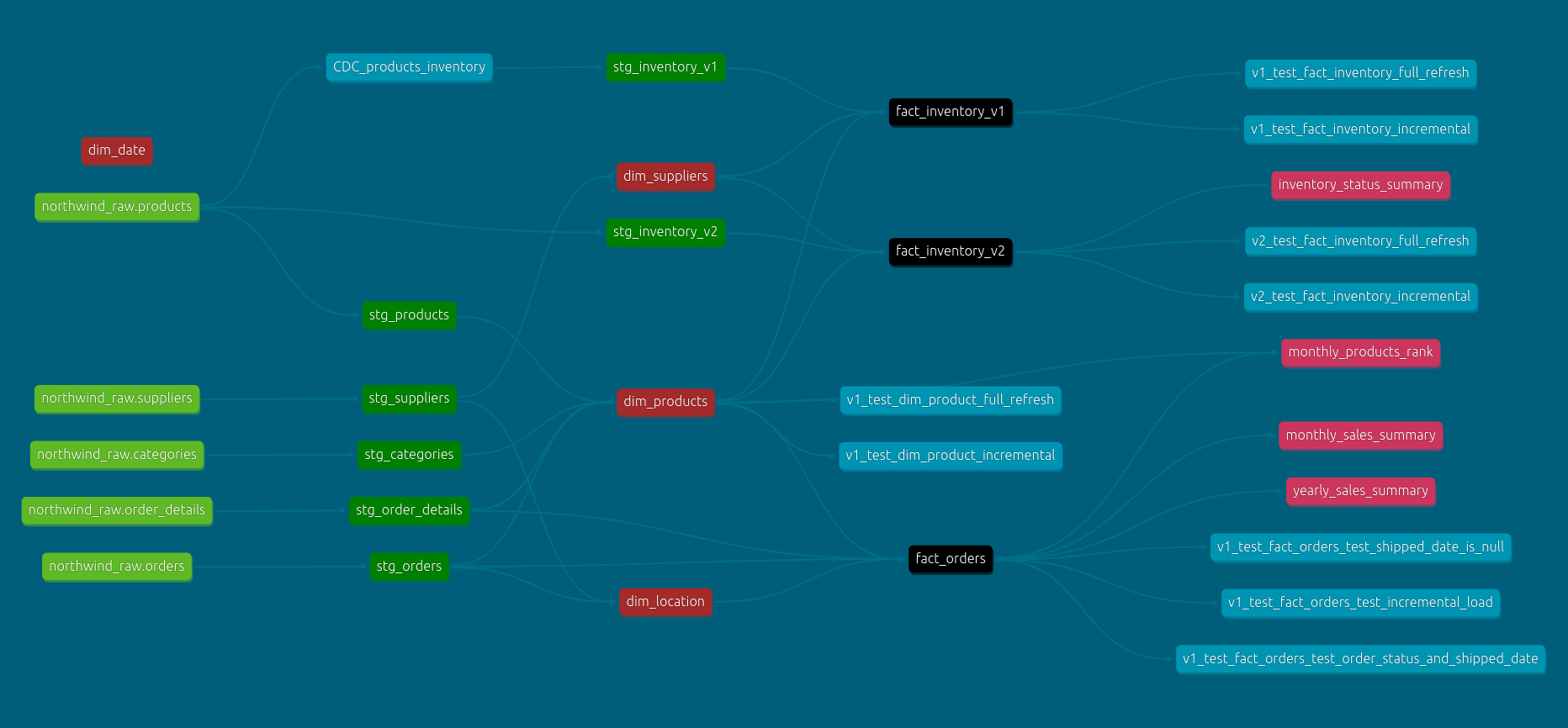DISCLAIMER: This project uses northwind as source data, which is a publicly avaiable dataset.
-
Unit tests 📑: Quality
data tests, andunit teststo simulate business scenarious. -
Data Tests 📑: Simple, but save these errors in a seperate table to curate them later.
-
Models Versioning ✨: Two versioned models,
stg_inventoryandfact_inventory. -
CI/CD 👾: Initialize test-environment, build models, run models in
incremental_mode, rundata tests, and rununit testsin isolated environment before merging intomainbranch - usingGithub Actions. -
Enforced Schema ✊: Prevents unexpected
data qualityissues caused by changes in the source schema. -
Slowly Chaning Dimension (SCD) type 2 🐢: Products SCD but with old way.
This project aims to craft a modern data warehouse solution that:
- 🤖 Track
ordersbyproduct,cateoryandlocation. - 🤖 Track
product price chaneges effect on orders. - 🤖 Track
Inventorydata to conduct Safety stock analysis in the future.
This is how I modeled the data—guided by Ralph Kimball’s principles in The Data Warehouse Toolkit 📖.
erDiagram
fact_inventory ||--o{ dim_products: "stores"
fact_inventory ||--o{ dim_suppliers: "supplied_by"
fact_inventory ||--o{ dim_date: "recorded_at"
fact_orders ||--o{ dim_location: "ordered_from"
fact_orders ||--o{ dim_products: "ordered_what"
fact_orders ||--o{ dim_date: "ordered_at"
fact_orders {
transaction_sk text PK
order_sk int
order_id int
order_date date
required_date date
order_status varchar
shipped_date date
location_sk text
product_sk text
unit_price numeric
quantity int
discount numeric
}
fact_inventory {
record_id text PK
product_sk text FK
supplier_sk text FK
units_in_stock integer
units_on_order integer
reorder_level integer
updated_at timestamp
}
dim_products {
product_sk text PK
product_id integer
product_name text
category_name charactervarying
unit_price numeric
quantity_per_unit charactervarying
start_date date
end_date date
is_active boolean
valid_days integer
}
dim_location {
location_sk text PK
address text
city text
region text
postal_code text
country text
}
dim_suppliers{
supplier_sk text PK
supplier_id int
company_name text
contact_name text
contact_title text
location_sk text
phone charactervarying
fax charactervarying
homepage text
}
dim_date {
date_day date PK
prior_date_day date
next_date_day date
prior_year_date_day date
prior_year_over_year_date_day date
day_of_week integer
day_of_week_name text
day_of_week_name_short text
day_of_month int
day_of_year int
week_start_date date
week_end_date date
prior_year_week_start_date date
prior_year_week_end_date date
week_of_year integer
iso_week_start_date date
iso_week_end_date date
prior_year_iso_week_start_date date
prior_year_iso_week_end_date date
iso_week_of_year integer
prior_year_week_of_year integer
prior_year_iso_week_of_year integer
month_of_year integer
month_name text
month_name_short text
month_start_date date
month_end_date date
prior_year_month_start_date date
prior_year_month_end_date date
quarter_of_year integer
quarter_start_date date
quarter_end_date date
year_number integer
year_start_date date
year_end_date date
}
Notice that fact_inventory has two versions. The first version uses source snapshots as an upstream model for its pipeline. On the other hand, in the second version, I realized that the snapshot step was unnecessary, so we removed it, resulting in two new models: stg_inventory.v2 and fact_inventory.v2.
With the help of the act tool, you can run and test your GitHub workflows locally using Docker. This allows you to catch issues before pushing changes to the remote repository.
Check
.github/workflows
To run a workflow locally and simulate a pull_request event, use the following command:
# Using act to run a GitHub workflow locally
# Secrets are stored in the .secrets file (create it yourself with required values)
act -P ubuntu-20.04=catthehacker/ubuntu:act-20.04 pull_request --secret-file .secrets --pull=false-
act: The CLI tool that simulates GitHub Actions workflows locally.
-
-P ubuntu-20.04=catthehacker/ubuntu:act-20.04: Specifies the Docker image to use. We're using an Ubuntu 20.04 image provided by act.
-
pull_request: Specifies the event type that will trigger the workflow.
-
--secret-file: .secrets: Points to a file containing secret values for environment variables.
-
--pull=false: Prevents act from automatically pulling the latest image (useful if you want to avoid an unnecessary download).

